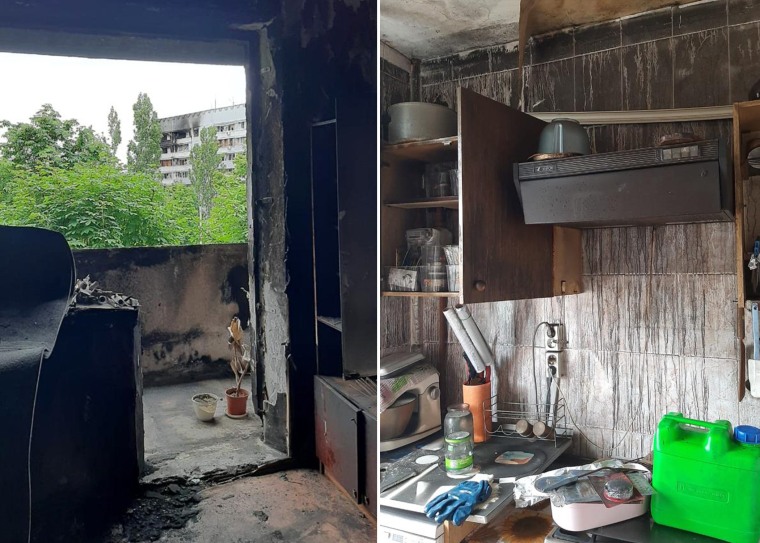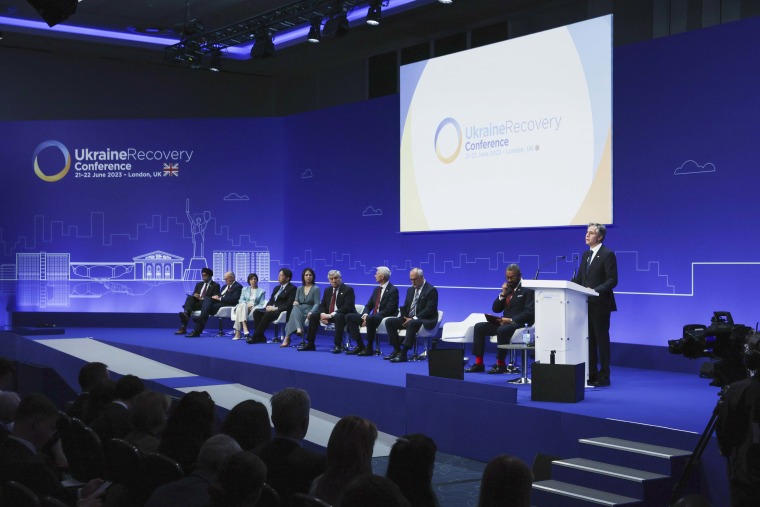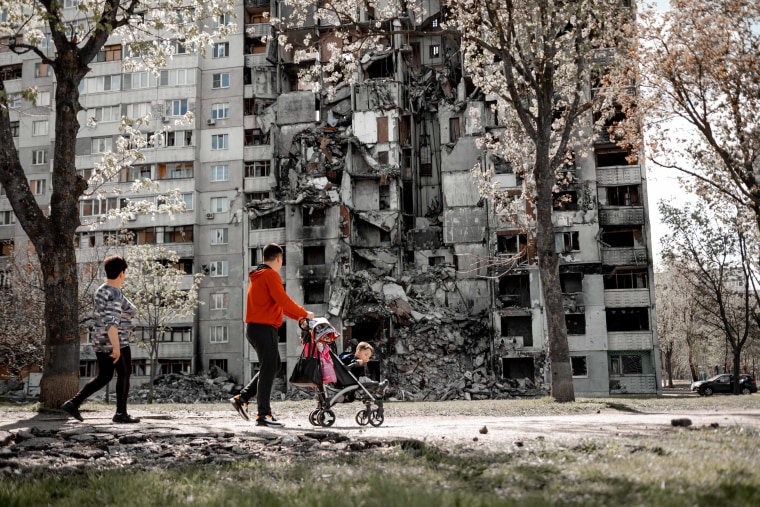KHARKIV, Ukraine — When she wakes up every morning, she looks for new cracks in the ceiling. She keeps track.
Svitlana Bobrysheva’s home in Ukraine’s second-largest city “continues to break,” she said this week, a result of Russian attacks that have left her country battered and in need of billions of dollars to rebuild.
International leaders and officials, including Secretary of State Antony Blinken, met in London on Wednesday to pledge new nonmilitary aid and to urge private-sector companies to help meet a reconstruction price tag the World Bank has estimated at more than $400 billion.
For Bobrysheva — whose building is so damaged that she, her husband and one of their children take turns sleeping in a tent outside — the help can’t come soon enough.
She said she's received no answer from local officials about when her home will be assessed or repaired, as Kharkiv struggles to rebuild months after Russian forces were driven out.
While Ukraine’s military pushes for more success on the battlefield, the vast scale of the effort and funding needed to ensure a post-war recovery is coming into view — through the boarded-up windows of Bobrysheva’s home and across the war-ravaged country.

Kharkiv, just 18 miles from the Russian border, was relentlessly shelled in the first days of the war. The city’s northeastern district of Saltivka, where the Bobryshevas live, took the brunt of the destruction.
Nearly every building in the district is damaged to some degree — some completely condemned to demolition, others with a mix of abandoned and lived-in apartments.
The city and its surrounding area were liberated by the Ukrainian army in a surprise counteroffensive last fall, revealing the level of destruction and just how much work is needed.
For nearly 16 months now Russia has pummeled Ukrainian cities, villages, transportation hubs and energy infrastructure with waves of missiles and drones. Many have been forced to flee elsewhere in the country or beyond, often after their homes were reduced to rubble.
Earlier this year, the World Bank assessed that the cost of reconstruction and recovery in Ukraine at $411 billion, a figure that’s likely to keep rising as the war drags on.
According to Ukraine’s own estimates, the country’s gross domestic product (GDP) fell by nearly a third in 2022. This has forced Kyiv to rely on its Western allies, including the U.S., for billions of dollars in military and humanitarian aid to keep the country running.
Speaking in London on Wednesday, Blinken said the Biden administration would give more than $1.3 billion in new aid, including more than $500 million to restore and improve Ukraine’s battered energy grid.

Ukrainian President Volodymyr Zelenskyy, who addressed the conference by video, said his country needed action.
“We must move from vision to agreements and from agreements to real projects,” he said.
‘Years and years’ of rebuilding
Yevhen Pasenov, the deputy head of Kharkiv’s department of utility services, is responsible for infrastructure maintenance, including residential buildings. Since the war began, he’s also been involved in the city’s reconstruction efforts.
He called the scale of destruction in Kharkiv “unreal,” with more than 4,500 residential buildings damaged and some 1,600 buildings directly hit by rockets or shells. With the war still raging, he said, they have only managed to repair about 200 sites across the city so far.
But there is no other choice but to start, Pasenov said, even though there is no guarantee that the Russians won’t destroy what’s being rebuilt again.
“If we stop, it will cost two or maybe three times more to restore all these houses in a year or two,” as the elements contribute to the damage, he said, adding that it could take “years and years, maybe even decades” to rebuild the city.
Pasenov said he wants the Russians to pay for the damage they caused — some of Ukraine’s Western allies have already started talking about diverting millions of dollars in Russian assets abroad, frozen by international sanctions since the invasion, for Ukraine’s recovery.
“We can’t return people’s lives, but those who did this need to pay for this,” Pasenov said.
He also wants international leaders to come to Kharkiv and see the destruction with their own eyes.
“We won’t be able to pay for this,” Pasenov added.

Back in her building, Bobrysheva shows the apartments where her neighbors lived just one floor up. Only charred walls remain, save for some ceramics and metal items that withstood the fire caused by the shelling.
Bobrysheva, who is currently unemployed due to a disability, used to work at the city’s tram depot and has lived in the neighborhood for decades, watching it grow and flourish.
She broke down in tears, looking out over the destroyed residential blocks that she remembers being built.
“My children were born and grew up here. They went to school and university here. My whole life, I spent here,” she said through tears. “These are the brothers and liberators,” she said, referring derisively to how the Kremlin has portrayed the Russian army’s purpose in Ukraine.
“They liberated us from absolutely everything,” she added. “There is nothing.”
Raf Sanchez, Alex Holmes and Anastasiia Parafeniuk reported from Kharkiv. Yuliya Talmazan reported from London.
